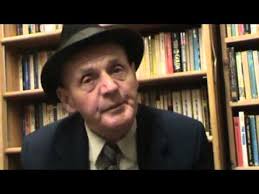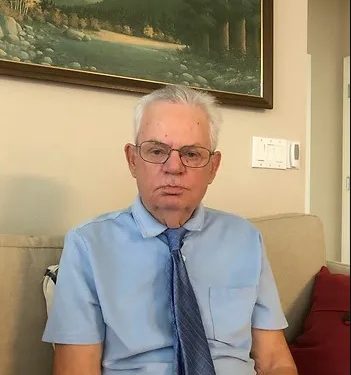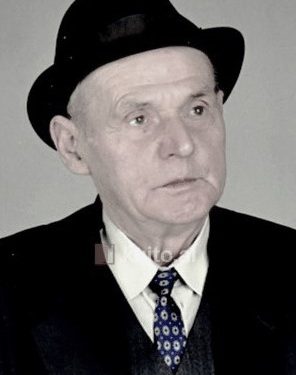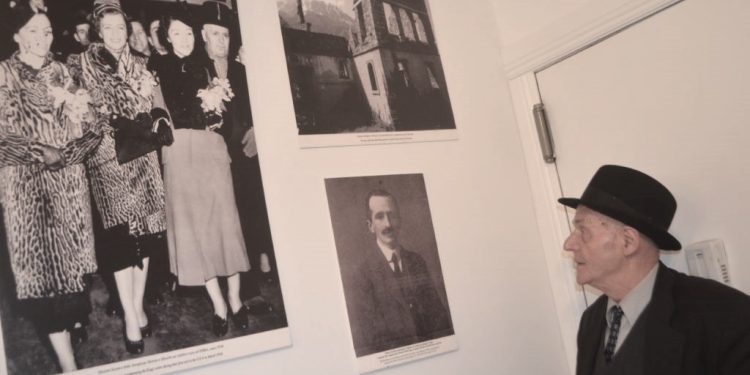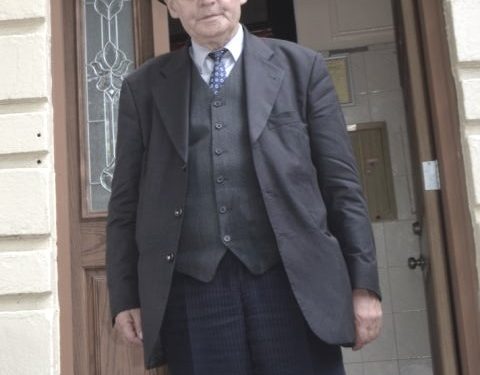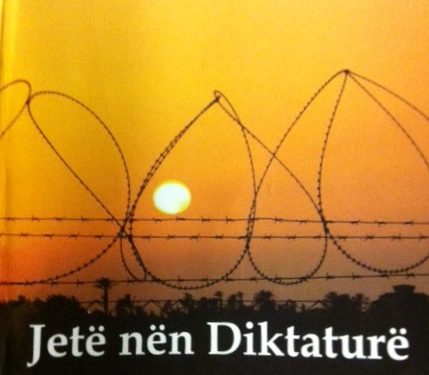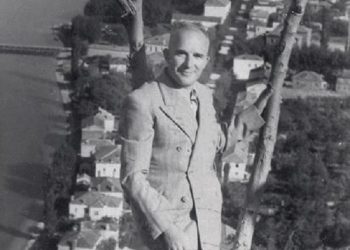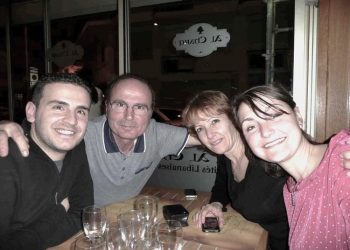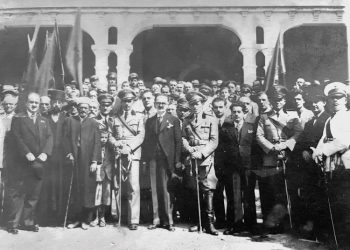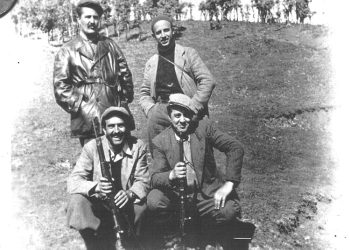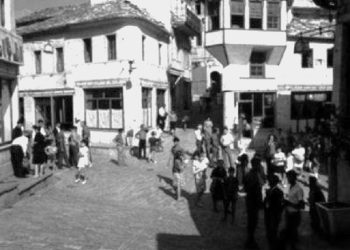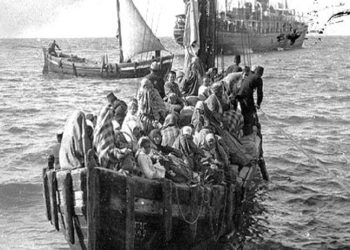Memorie.al / Hasan Kostreci is one of the afflicted creators who earned the right to use the pen as writers after the capitulation of the dictatorship. His case even differs somewhat from his colleagues in this group, as he resumed his literary work not immediately after the dictatorship’s capitulation, but 15-17 years after moving to the USA, once he had fulfilled his essential family obligations, such as adapting to the new homeland, raising and educating his two young daughters, and retiring. He first began publishing several stories in the Albanian-American newspapers “Illyria” and “Dielli”, which he compiled in 2009 into the volume “Dimër në luginën e Drinit” (winter in the Drin Valley).
In 2011, he published his autobiography, “Jetë në Diktaturë” (Life in a Dictatorship), which received evaluations from Astrit Lulushi, Kostaq Xoxa, Reshat Kripa, Iliaz Gogaj, etc. We will focus on the second edition (KLEAN Printing House, Tirana 2012, 248 pages), which includes a preface by the well-known physicist, journalist, publicist, and diplomat, Skënder Shkupi.
This author’s innate talent is evident in the successful descriptions of events, the reproduction of prototypes, and the creation of certain characters, phenomena that elevate the nature of the work from a mere memoir to a hybrid work situated between memoiristic writings and the autobiographical novel.
The subject of “Jetë në Diktaturë” is unfolded across 33 chapters in chronological order, with occasional digressions included. It recounts the life of the Kostreci family during the years of the communist dictatorship. The family consisted of five people: the two parents, the two sons, and the aunt, the father’s sister, who was an unmarried, myopic girl. The head of the family, Fuat Kostreci, was educated in Istanbul. He was the nephew of the politician, Mehdi Frashëri. In Albania, he had worked as the Director of the Customs Office.
Without having any political activity against the Communist Party, he was arrested in 1946 and sentenced to life imprisonment, when his wife was very young and had two sons, aged 3 and 7. From this event onward, the family was placed on the list of “enemies of the regime,” and as such, found it difficult to live in Korça, where they were known by the employees of the Sigurimi (Secret Police) and the Party. To escape persecution, the mother was forced to change her residence, from Korça to Qafëzez in Kolonjë, where she had some property and relatives.
Furthermore, to prevent her children from only having the 7-year schooling available in that village, the mother moved the family to Tirana, but after a year of exhaustion, she was forced to move again to Elbasan. Here, thanks to the tolerant nature of the people towards the Party’s politics, the family found a less hostile environment.
The author begins his memoirs from his tender age, with a shocking scene. Five months after the arrest, before his trial had even begun, his father continued to be tortured in the investigation cells. The mother and younger son went to visit him to bring some food and change of clothes. Only Hasan, 3 and half years old, was allowed inside. In the investigation cellars, he saw a half-naked man, lying down with his hands and feet tied who had fallen into a stupor and was unresponsive. This man bore no resemblance to his handsome, blonde father, whose portrait Hasan kept on his bedside table. The narrative continues:
–“Dad, I called out in a low voice, but he didn’t answer me. From beneath my feet, I felt the dampness of the basement, as well as a bad, heavy smell that blocked my breath. I turned my head, but the ‘Cyclops’ (the policeman) was no longer there. A chill went through my soul, and hot tears rolled down my cheeks. I tried to speak to him, but I couldn’t; my mouth went dry, and I was about to collapse. I rushed up the stairs, went outside, and threw myself into my mother’s arms.”
Through this traumatic scene, the child Hasan confronted the tragedy of his family, a scene he reproduces vividly, and 63 years later, as if it had happened yesterday. Moving and shocking are also many other events, including the death of the mother, this heroine who honorably endured all the persecutions: the arrest and imprisonment of her husband, the hardships of raising two sons, the imprisonment of the elder son, the aging of her sister-in-law and husband, her own illnesses, etc.
The work reproduces events, conversations, emotions, thoughts, and reflections on events that happened to the author and his family outside of prison, in what was called “free life.” However, families with a “bad biography,” which included families with convicted members, like the author’s, lived in a state of semi-slavery, with great shortages and humiliating poverty. The regime’s cruelty towards this stratum is conveyed by recounting moments of political persecution and economic devastation.
In Tirana, the family was forced to survive by eating only one meager meal a day and a cup of tea in the evening, sheltered in a room without a fire, without a bathroom, and without running water. Despite these difficult economic and political conditions, the members of this family did not compromise their morals; they all stood as worthy descendants of their class, the class that had been formed over generations through hard work.
Even though the children of this overthrown class were severely oppressed for half a century, they always remained morally superior to their oppressors, who, working passionately as blind tools of that system, descended further each day towards the loss of moral and human qualities.
The main heroes of the work are the heroic trio: the mother Nuko and the two sons, Hasan and Uran. Naturally, the author takes the central place, as he writes about what he saw and lived through himself, but the mother and brother are also main protagonists, whose lives contribute to the unfolding of the events. By analyzing the generous, compassionate, and very patient character of the mother, we also understand why Hasan, who resembled her, endured all the suffering and pressures with patience, without falling into the traps of the system, which sought to imprison him just like his father and brother.
Uran, being the older son, suffered the family drama more deeply. His life is presented as it was the life of an impulsive person who revolted against oppression and injustice, a man who endured prison twice and later internment. To survive, the two brothers began serving as porters (hamenj) at the train station in Tirana from a young age. Hasan became conscious at 17 of the role he had to play for the family’s survival.
Without finishing high school, he sought work as a teacher in the remote villages of Gramsh and, while working, studied and passed the graduation exams for the gymnasium and the Pedagogical School. After completing his military service in a labor brigade, Hasan, wanting to be close to his aging parents, asked to leave education, started working as a motorist (driver/mechanic), attended Mechanical School while working, and as a mechanic, worked up and down in a vehicle repair brigade.
The wisdom and prudence inherited from his parents and the responsibility he felt to ease, even slightly, the suffering caused by the political, economic, and social upheaval of the family, gave this young man the strength to endure the hardships and harassment. They gave him the strength to always be an agreeable person with everyone. The guitar he learned during his school years made Hasan well-liked not only by his teacher colleagues but also by reasonable superiors.
This afflicted writer is also distinguished by his humanism, much like Father Zef Pëllumbi, Visar Zhiti, etc. He reproduces life as he lived it, without making it dark. Vengeance is alien to Kostreci. Through the main events, the writer reveals the Albanian tragedy: The struggle of the PKSH (Communist Party of Albania) – PPSH (Party of Labour of Albania) for the rule and transformation of Albania led to the destruction of the morality of those Albanians who obeyed and followed it. But alongside the base actions and behavior of the regime’s servants, he also shows the kindness of the director of the enterprise, who authorized a new apartment for him, while giving the room where Hasan lived to Uran, who had just been released from prison.
During his years as a teacher in the deep villages of the Gramsh district, it is shown that the teachers, the people, and the students tried to live life within their means with some themed entertainment evening, a dinner after work, or some romantic flirtation. A life that worsened after 1973, with the holding of the 4th Plenum of the PPSH, which deepened the fight against foreign influences and bourgeois liberalism.
The work is noted for the richness of life prototypes drawn from many spheres and layers of life. It describes the warm and humane relationships with friends, relatives, cousins, neighbors, workers, and peasants, who placed human behavior above politics. Among these prototypes, two courageous women shine: Aunt Nurie and Flutura Toptani.
The aunt is presented in many episodes, as she lived with the author’s family during those years. The characterization she gave to the communist officials from the beginning with the epithet sojsëzë (scoundrels/degenerates), an epithet she repeats from time to time like a refrain, is an apt characterization for all those people who, through class warfare, destroyed thousands of families with the aim of instilling fear and terror in the people to rule more easily.
Flutura Toptani, who was Abaz Kupi’s granddaughter on her mother’s side, is the young woman with whom life connected the author. This connection was not established during work relations nor from love at first sight. The cause of their acquaintance was an introduction by a friend of his, who was the girl’s brother-in-law, thus a good acquaintance of both young people. Their connection, although described in few pages, is an acquaintance that naturally strengthened between two mature people who had similar fates under the communist regime.
Flutura quickly manifested her intelligence, character, and noble upbringing. When Hasan’s mother fell ill with cerebral ischemia, this girl knew how to determine that the moment had come when their acquaintance should transition into marriage, because her service to the paralyzed mother was necessary. Such a decision touched the hero of the work, and although he doesn’t describe it, it is implied that the fire of a powerful love, which never faded, was ignited in his heart.
A love born in moments of shared suffering and sacrifice ennobled and sanctified the afflicted people. This kind of love, shaped by sacrifice, that these young people experienced, could not be experienced by the spoiled people of the dictatorship, who, in marital ties, as in every step of life, prioritized political careers and material gain above all else.
The literary character of the work is reinforced by the creation of Kudret, an alter ego character of the author. In the final chapters of the novel, when the capitulation of the dictatorship was being felt, the author expresses hope that life would change positively, and that former officials might evolve. Kudret opposes such thoughts to the author, with disbelief. The thoughts of this character express the author’s thoughts 20 years after the capitulation of the dictatorship, when the romantic enthusiasm of the democratic movement had faded, because it had become clear that the true right wing in Albania had been suffocated by deceitful politicians.
Mikhail Gorbachev, during his meeting with US President George Bush in Malta, on December 2-3, 1989, announced the capitulation of the communist dictatorial system. The PPSH, the state party of communist Albania, took steps during 1990 to clean Albania of persecuted families, so that they would not be in the homeland when pluralism was announced and form a truly anti-communist opposition party. It, pretending to be generous towards the Kupi, Gjonmarkaj, Pervizi, Merlika, Kostreci, Korça, etc. families, proposed that they connect with their relatives abroad and if they accepted, the state would provide them with passports and visas to go to their relatives.
After half a century of persecution, these families could not help but take advantage of such an opportunity to escape the hell where they had suffered for so long. Thus, the author’s family, like the other persecuted families, accepted departure as a path to salvation. This departure did not signify abandoning the homeland, but finding a solution to secure a better future for the children.
It is worth emphasizing that the Kostreci family, along with the majority of persecuted families, when they left the homeland in 1990, left as victors over the dictatorship to which they never submitted. They had been renewed in composition; they had replaced their deceased parents with beautiful and intelligent children…!
The last chapter of the work is a synthesis of Albanian life from 1985-1990. It analyzes the second Albanian dictator, Ramiz Alia, who pretended to be a liberal but was, in fact, just as criminal as his spiritual father.
The mastery of the artistic description of events reaches its crescendo in the description of the anxiety and emotions the author experienced in realizing his family’s departure from the homeland. After many struggles, Hasan managed to secure the visas. He sold all the furniture (katandi) of the house to secure the sum of two hundred dollars to buy tickets from Tirana to Rome, where Flutura’s relatives would meet them.
However, the tickets were sold out, the visa was expiring, so he was forced to trust a blonde airport employee who took his money, promising to secure tickets for November 14, 1990. At the appointed time, all the passengers boarded, and the blonde girl was nowhere to be seen. The Kostreci family, especially Hasan, was petrified. The dream of salvation from the communist ordeal was being jeopardized; it seemed as if the Sigurimi, who had pursued and tormented them all their lives, was intervening again.
Like a somnambulist, he headed towards the airplane steps with the two heavy suitcases. He climbed one… two… three… steps, and the blonde girl still hadn’t appeared. He didn’t know how to explain himself to the stewardess at the door…! At this moment, sweat was covering him, his heart seemed to stop beating…! Then, the blonde girl appeared. The family entered the airplane with frozen blood. Hasan’s heart began to beat normally when he saw the waters of the Adriatic Sea below the airplane; his blood thawed, and his complexion returned to normal…!
The dignified works that Lek Pervizi, Eugjen Merlika, Mërgim Korça, Makinsen Bungo, Gjon Markagjoni i Ri, Hasan Kostreci, etc., etc., have written and are writing in emigration, prove that these worthy sons of the people have not abandoned the homeland, but are helping it to recognize the communist crime in all its dimensions and to condemn it, because the cleansing of the incriminated Albanian conscience lies in its condemnation. Memorie.al




